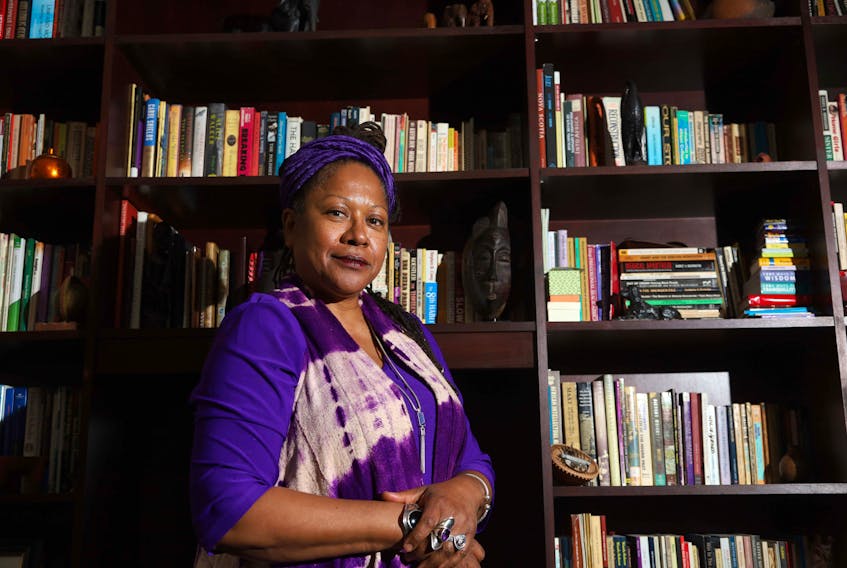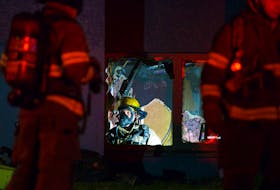An African Nova Scotian woman has won a leadership award for her wide-ranging contributions as a global citizen.
In a virtual ceremony on Thursday, Delvina Bernard was presented with the Shirley Case Leadership Award for Global Citizenship.
The award is presented annually to an individual “who has demonstrated a spirit of global citizenship in a local, national or international capacity and who has helped create a more just and sustainable world,” according to the Atlantic Council for International Cooperation.
It honours the life of Shirley Case, a Canadian woman who was killed in Afghanistan on Aug. 13, 2008 while working with the International Rescue Committee.
‘We have to act with a global mindset’
“I’m so truly honoured to be receiving an award that is named after someone who paid the ultimate price with their contribution of life,” said Bernard, who is a Halifax-based educator, civil and human rights activist and singer/songwriter.
“And when you have a loss of life for wanting to change the world, that should make us pay attention to how important it is to become global citizens.”
ACIC is pleased to announce the winner of the Shirley Case Leadership Award for Global Citizenship 2020: 🎊🎉🎊🎉 DELVINA...
Posted by Atlantic Council for International Cooperation on Wednesday, 21 October 2020
As the principal founder of the Africentric Learning Institute of Nova Scotia, longtime Oxfam Canada board member and part of the politically inclined a cappella quartet Four The Moment, Bernard said the award aligns with her philosophy and personal life mission.
“We have to have, I believe, a global mindset. And I believe not only do we have to have a global mindset, we have to act with a global mindset — not just a thought, but we have to act with a global mindset if we are serious about social justice,” she added.
‘I had to buckle down to fight’
Bernard said she became an activist at just nine years old.
That’s when she was first confronted with racism in Nova Scotia, she said, after her elementary school in the African Nova Scotian community of Lake Loon shut down as part of a wave of school closures in the 1970s and she had to instead attend a predominantly white elementary school.
Every week day, she would walk to school and back. At school, she said she’d hear racist comments from her white classmates on a daily basis. Outside of school, she’d hear her classmates’ parents direct similar racist comments toward her — the N-word being one of them.
“I had to fight my way to and from school and that’s when I realized that there was injustice in this society,” she said.
“And at that tender age, I lost my childhood innocence and I had to buckle down to fight for myself everyday and from there on I had to fight for my people everyday.”
Coming to terms with global identity, struggles
A sixth generation African Nova Scotian, Bernard began to learn of her Canadian ancestry in her teenage years, which traces back to the Black Royal Empire Loyalists of 1783 and the Black Refugees of 1812.
She said it was through learning about what happened to Black people during the slave trade in junior high school that she came to terms with her “global African identity” and she didn’t just identify with Nova Scotia, but with Africa, the Caribbean and the United States, too.
From that point, Bernard said she wanted to promote social change and human rights not just locally, but “for my people all over the globe” as well as others “who are suffering the same way that people from Africa are suffering” from the effects of colonialism and discrimination.
Caring about people locally, globally
At home, Bernard helped to establish the Africentric Learning Institute of Nova Scotia, which she said is aimed at “helping Black people in Nova Scotia to centre themselves in their own culture, in their own history” and to “teach them what it means to be a global citizen.”
She also served for 18 years as the executive director of the Council on African Canadian Education and as an Afrocentric education policy adviser to the Nova Scotia Department of Education.
“I learned to care about people globally by first of all caring about my people locally,” she said.
Since 2013, Delvina has been a board member of Oxfam Canada, which is an international development and humanitarian relief organization with a focus on human rights.
But she got involved with the organization long before that, she said, by raising money and awareness for the organization from as early as when she was in Grade 6.
As a nationally recognized artist, Bernard has also used her music “as a stage for promoting awareness of global social injustice” across Canada and other parts of the world, she said.
Her group, Four The Moment, has promoted anti-apartheid work in South Africa, anti-oppression against women globally and anti-oppression against citizens in Latin America, and Black history in Canada, among other topics.
Currently, Bernard is a PhD student in international development at Saint Mary’s University, where her research is examining reparations for the Caribbean as a development strategy to overcome the legacy of enslavement, colonization and cultural genocide.
Hopes for the future
Reflecting on her global citizenship work that she has done and she continues to do, Bernard said she wants “this generation to keep struggling to demand justice and to act in a way for justice locally and globally,” by getting educated about both local and global issues.
“Because we can very easily lose our civil rights and our human rights here in Canada, and we mustn’t stop fighting so that people who are born in places like Syria shouldn’t have to be washing up on a beach in Greece,” she added.
“It’s not fair that they have to leave everything behind to save their life. People should be able to have a good life wherever they are born.”









